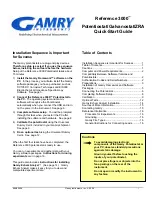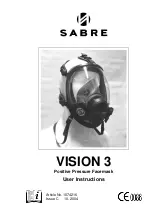
Brookfield Engineering Labs., Inc.
Page 108
Manual No. M13-167-A0415
When a UL or DIN UL Adapter is used, the water bath is stabilized at the proper temperature:
1) Put the proper amount of viscosity standard fluid into the UL Tube (refer to the UL
Adapter instruction manual).
2) Attach the spindle (with extension link and coupling nut) onto the DV3T.
3) Attach the tube to the mounting channel.
4) Lower the tube into the water bath reservoir, or if using the ULA-40Y water jacket,
connect the inlet/outlets to the bath external circulating pump.
5) Allow 30 minutes for the viscosity standard, sample chamber and spindle to reach test
temperature.
6) Measure the viscosity and record the Rheometer reading.
Note: The spindle must rotate
at least five (5) times before readings are taken.
Calibration Procedure using a Helipath Stand and T-Bar Spindles
When a Helipath Stand and T-Bar spindles are used:
1) Remove the T-bar spindle and select a standard LV (#1-3) or RV, HA, HB (#1-6) spindle.
Follow the procedures for LV (#1-3) and RV, HA, HB (#1-6) Brookfield spindles outlined
above.
2) T-Bar spindles should not be used for verifying calibration of the DV3T Rheometer.
Calibration Procedure for Spiral Adapter
Brookfield recommends a two step check. First, verify the calibration of the rheometer using the
standard rheometer spindles (LV #1-3, RV #2-6, HA #2-6 and HB #2-6 or cone/plate spindles)
as detailed in this appendix. Second, verify the calibration of the rheometer using the Spiral
Adapter. The use of an accessory device may increase the accuracy of measurement associated
with the DV3T.
1) Place the viscosity standard fluid (in the proper container) into the water bath (refer to
the Spiral Adapter instruction manual).
2) Attach the spindle to the rheometer. Attach chamber (SA-1Y) and clamp to the rheometer.
3) Lower the DV3T into measurement position. Operate the rheometer at 50 or 60 RPM
until the chamber is fully flooded.
4) The viscosity standard fluid, together with the spindle, should be immersed in the
bath for a minimum of 1 hour, stirring the fluid periodically (operate at 50 or 60 RPM
periodically), prior to taking measurements.
5) After 1 hour, check the temperature of the viscosity standard fluid with an accurate
thermometer.
6) If the fluid is at test temperature (
+
/- 0.1
°
C of the specified temperature, normally 25
°
C),
measure the viscosity and record the rheometer reading.
Note: The spindle must rotate
at least five (5) times for one minute, whichever is greater before readings are taken.
7) The viscosity reading should equal the cP value on the viscosity fluid standard to within
the combined accuracies of the rheometer and the standard (as discussed in the section
entitled, Interpretation of Calibration Test Results). However, instrument accuracy is
±2% of the maximum viscosity range and not the standard 1%.
Summary of Contents for DV3T
Page 2: ......
















































